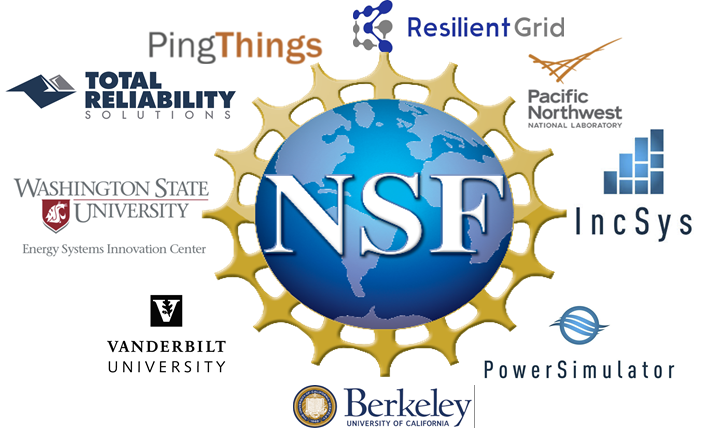

Effective decision making by power grid operators in extreme events (e.g., Hurricane Maria in Puerto Rico, the Ukraine Cyber Attack) depends on two factors: operator knowledge acquired through training and experience, and appropriate decision support tools. Decision making in electric grid operation during extreme adverse events directly impacts the lives of citizens. This project will augment the cognitive performance of human operators with new, human-focused decision support tools and better, data-driven training for managing the grid, especially under highly disruptive conditions. The development of a new generation of online knowledge fusion, event detection, cyber-physical-human analysis in the operational environment can be applied to augment human operators during extreme events and provide energy to critical facilities like hospitals, city halls and essential infrastructure to keep our citizens safe and avoid a huge economic loss for the Nation. Higher performance of operators will improve worker quality of life and will enhance the economic and social well-being of the country. Our training objectives will leverage existing educational efforts and outreach activities, and we will publicize the multidisciplinary outcomes through multiple venues.
This project will integrate principles from cognitive neuroscience, artificial intelligence,
machine learning, data science, cybersecurity, and power engineering to augment power grid
operators for better performance. Two key parameters influencing human performance from the
dynamic attentional control (DAC) framework are working memory (WM) capacity, the ability to
maintain information in the focus of attention, and cognitive flexibility (CF), the ability to
use feedback to redirect decision making given fast-changing system scenarios. The project will
achieve its goals through analyzing WM and CF and performance of power grid operators during
extreme events, augmenting cognitive performance through advanced machine learning-based
decision support tools and adaptive Human-Machine system, and developing theory-driven training
simulators for advancing cognitive performance of human operators for enhanced grid resilience.
A new set of algorithms is being developed for data-driven event detection, anomaly flag
processing, root cause analysis, and decision support using semi-supervised and unsupervised
learning improved for online learning and decision making. Additionally, visualization tools
will be developed using cognitive factor analysis and human error analysis. The project will
utilize a training process driven by cognitive and psychometric analysis and inspired by our
experience in operators training in multiple domains: the power grid, aircraft, and spacecraft
flight simulators. A systematic approach for human operator decision making is developed using
quantifiable human and engineering analysis indices for power grid resiliency.
This project
is sponsored by the National Science Foundation:

The objective of this project is to enhance reliability and accuracy of decision making in the power system control room by proposing methodologies that systematically augment operator situational awareness by achieving the right balance between information maintenance and updating:
| Sr. No. | NAME | ORGANIZATION | PROJECT ROLE |
|---|---|---|---|
| 1 | Anurag K. Srivastava | Washington State University | Lead PI |
| 2 | Paul Whitney | Washington State University | Co-PI |
| 3 | Adam Hahn | Washington State University | Co-PI |
| 4 | Saeed Lotfifard | Washington State University | Co-PI |
| 5 | Anjan Bose | Energy Systems Innovation Center/ Power Engineering Partnership | Co-PI |
| 6 | Alexandra von Meier | University of California, Berkeley/ CIEE | Co-PI |
| 7 | Gautam Biswas | Vanderbilt University | Co-PI |
| 8 | Abhishek Dubey | Vanderbilt University | Co-PI |
| 9 | Robin Podmore | IncSys/PowerSimulator® | Senior Personnel |
| 10 | Michael Legatt | ResilientGrid | Senior Personnel |
| 11 | Jodi Heintz Obradovich | ResilientGrid | Senior Personnel |
| 12 | Sean Murphy | PingThings | Senior Personnel |
| 13 | Eric Andersen | Pacific Northwest National Lab | Consultant |
| 18 | Michael Cassiadoro | Total Reliability Solutions | Consultant |
| 19 | Hongming Zhang | Peak Reliability | Consultant |
| 20 | Khalid Abdul-Rahman | California ISO | Unpaid Consultant |
| 21 | Aaron Janisko | Snohomish PUD | Unpaid Consultant |
| 22 | K S Sajan | Washington State University | Post-Doc |
| 23 | Nie Zhijie | Washington State University | PhD Student |
| 24 | Hussain, Mohammed Mustafa | Washington State University | PhD Student |
| 25 | Mohammad Ghanaatian-Jobzari | Washington State University | PhD Student |
| 26 | Anthony Stenson | Washington State University | PhD Student |
| 27 | Mohini Bariya | University of California, Berkeley | PhD Student |
| 28 | Miles Rusch | University of California, Berkeley | PhD Student |
| 29 | Ajay Chhokra | Vanderbilt University | Post-Doc |
| 30 | Carlos Barreto | Vanderbilt University | Post-Doc |
| 31 | Sanchita Basak | Vanderbilt University | PhD Student |
As of August, 2020:
Check the project details here.